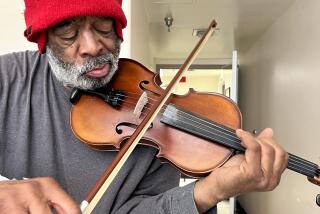Private Geriatric Case Managers Emerge to Help Frail Elderly
- Share via
Ruth Fields, a retired social worker and one-time avid reader and opera buff, sits impassively at her kitchen table.
“I want to understand it, but I’m having a little trouble understanding it,” says Betty Feibusch, the visiting nurse. “What is it about the weekend aide that is making you unhappy?”
“In my point of view,” Fields says, “Glynnie is a very tall, bright, mixed-up girl.”
“What is she mixed up about?”
Fields’ eyes flicker in confusion.
Fields, who is 72, is recovering from a subdural hematoma, or blood clot in the brain, she suffered four months ago in a fall outside her New York City apartment. A vital, independent woman before the accident, she had been making plans for a trip to London. The injury impaired her speech and motor skills and left her weak, confused and incontinent.
Feibusch is a private geriatric case manager, one of a new breed of practitioners to emerge in response to the surge in the nation’s elderly population. For an hourly fee, she and her colleagues offer highly personalized services to frail, older people and their families, helping them negotiate the labyrinthine health and social service systems.
Hired by the Son
Feibusch was hired by Fields’ son, Jeremy Z. Fields, who lives in Chicago. A few days before her visit, Feibusch had answered a call to her beeper from Jeremy Fields. The round-the-clock, weekday aide Feibusch had arranged was working out fine, he reported, but his mother didn’t like the weekend aide. “I reassured him that she wasn’t abusing mother and that we would explore the situation,” Feibusch said.
Fields, a medical researcher and pharmacologist, had feared that because he lived so far from his widowed mother he would have to place her in a nursing home. But when he consulted a New York attorney about financial arrangements, the lawyer “came up with this whole other alternative,” he recalled. “No one at the hospital apparently had ever heard of it, which surprised the heck out of me.”
People over 85 years old are the fastest growing segment of the elderly population. The so-called “old-old” often have chronic, debilitating illnesses, and dozens of supportive services have emerged to help them avoid the expense of nursing homes. These range from intensive home-nursing care for patients hooked up to respirators or gastric feeding tubes, to a host of home and community services for the less severely ill, such as meals on wheels, adult day care, housekeeping, telephone reassurance and transportation.
But the services vary from community to community, and there is little coordination among them. While many low-income people are guided through the maze by government programs and church-affiliated social service agencies, middle-income people often are ineligible for such assistance or are uncomfortable going to public or charity agencies for help.
Enter the private geriatric case manager, or “care” manager, as many prefer to be called. By the best estimates, they number about 400 nationwide. Most are highly trained, experienced geriatric social workers or registered nurses. Like other entrepreneurs, they believe they are offering a unique product to a receptive, untapped market, and they have chosen to sacrifice the security of a salary for the risks and freedoms of self-employment.
Manhattan Office
Betty Feibusch and her partner, Sarah N. Cohen, a social worker, operate their 5-year-old firm, Options for Aging, out of a tiny, windowless back room in the Upper East Side Manhattan offices of Cohen’s husband, gastroenterologist Bernard R. Cohen. They have outgrown the space but aren’t sure they can afford to move. The company expects to gross about $75,000 this year, Cohen said, one-fourth of which will cover overhead expenses.
The two women handle about 50 cases per month, and charge a fee of $75 per hour. Health insurance by and large does not cover their services. On a recent afternoon, Cohen returned to the office after an absence of a few hours to find 10 messages on the answering machine, many regarding arrangements for home health aides. She spends about half her time arranging or monitoring home aides and another chunk of time guiding low-income elderly clients through the complex, grueling process of applying for Medicaid benefits.
In many instances, Cohen’s fee is paid by the affluent children of elderly clients. She regards these family members as her clients, too. Stephen Aaron, a New York City clinical psychologist, employed Options for Aging for three years, until his mother’s death last summer at age 91. His mother required round-the-clock home care, and the case managers “took off my shoulders the burden of finding people,” Aaron said.
Cohen also conferred with Aaron’s mother’s physicians about her diet and suggested ways to improve her home environment. “And in her capacity as a social worker she worked with me on the terrible feeling of loneliness I had,” Aaron said. “I’m an only child. The feeling that I had somebody with me was of enormous help.” Options for Aging recommends that clients hire home aides supplied by a registry they have come to trust and with whom they have an informal, non-financial relationship.
Most private case management firms are no more than 3 years old and are one- or two-person operations, according to a survey of 117 companies published in July by InterStudy, a Minnesota-based group that conducts research on health care issues.
The primary role of the private case manager, the survey found, is to assess the functional limitations and social and financial needs of the older client and develop a care plan. Usually, case managers do not provide the services they recommend, but draw on their familiarity with the local service systems and their extensive contacts to help family members arrange care. Often the case manager remains involved, monitoring services being provided and orchestrating changes as needed.
Unlike most agency-based case managers, private practitioners are available to clients around the clock, and they sometimes assume the role of a surrogate family member in the services they provide. Cohen and Feibusch, for example, have transported an elderly client to the beauty shop, made sure that a home aide prepared a special meal on a religious holiday, invited a daughter out for a Scotch after she placed her mother in a nursing home, and taken a frazzled home aide for a walk in the park.
“A friend of mine became the recipient of an urn of ashes of one of her clients,” Cohen said. The man had no family. “She gave the eulogy at his funeral, to nobody. She was the only attendant. So we often get very personally involved.” The typical private case management client, InterStudy found, is a widow living alone, between 75 and 84 years old, with an annual income of $35,000 or less who is ineligible for Medicaid, the government health insurance program for the poor. Referrals tend to come from physicians, attorneys, hospital personnel and other clients. The case manager may be hired by a spouse, adult child, attorney, bank official or court-appointed conservator. Many of Options for Aging’s clients have dementia and cannot care for themselves.
Case management firms generally employ at least one person with a postgraduate degree, often in social work, according to InterStudy. These practitioners are held to the standards of their national professional associations. But “for the most part, anyone can go into private practice as a case manager,” InterStudy notes. “The absence of regulation and oversight has caused concern on the part of professional organizations, service providers, advocates of older persons and some policy makers,” the report says.
Another danger is that private case managers will manufacture “problems that aren’t real in order to stay in business,” said Paul A. Kerschner, president of the National Foundation for Long-Term Health Care, a Washington-based research and education group. “Agencies like Catholic, Jewish or Methodist social services or the VNA (Visiting Nurses Assn.) have pretty good mechanisms for control,” Kerschner said. “People aren’t as apt to go off on their own.”
More to Read
Sign up for Essential California
The most important California stories and recommendations in your inbox every morning.
You may occasionally receive promotional content from the Los Angeles Times.










